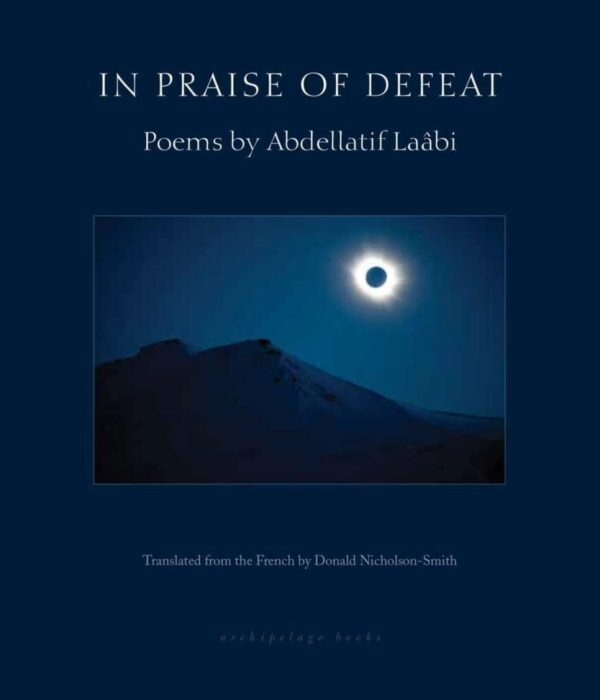In Praise of Defeat. Abellatif Laâbi. Translated from the French by Donald Nicholson-Smith. Archipelago Books. Brooklyn, New York. 2016.

There are many joys associated with doing Today's book of poetry but there is also a little pain, we are constantly rediscovering and confirming our vast ignorance. Until Abdellatif Laâbi's In Praise of Defeat landed on our desk we had never heard of the major francophone voice of Moroccan poetry.
In Praise of Defeat brings together work from fifteen or more of Abdellatif Laâbi's books of poetry. Was it T.S. Eliot or Ezra Pound who wrote about "perfecting the language of the tribe?" I think it was Pound. Well he wasn't alone. Moroccan exile Laâbi has perfected a certain sort of precision in bringing us from his childhood in Fez to his forced exile in modern Paris.
Talisman's Eye
everything dies
patched-up brain down in crypts
dies
logos of cities
dies
reason dies
crushed by wrinkles
with no help from hands
brain with its gray cells
dies
night approaches with so much telling
of rosaries
for the break of a new day
as the sphinxes say
when none is possible
they themselves having grown old
wearing of their alliance
with the wind
now
I seek a language
for my tribe
that is not a hybrid
let cyclones of argan trees
come join my fingers
collar of wasps
around my throat of clay
my awful lucidity
like a mirror
rusty with memories
that are the butt of History
now I know what power inhabits me
peoples run through my language
while flaming night
constructs silence
with hammer blows
I compose lullabies
my awful lucidity
that ruffles my voice
to the caravans' cadence
my awful lucidity
that carves me out an ear
as wide as the desert
now
I need to vomit up
layers of narcotics
and steaming manure
words of reason pale as herb tea
and throw away books that taught me pride
here I am
present
night-hairy
bristling with wasps
with that perfume of the muscles
that camel's boniness
ready to bound down the road
yelping
look and see if my breasts
are not bursting with maledictions
but leave me a few blood vessels
just a few nerves
nothing but a finger
and I shall outline on my parchment
a new cosmogony
its elements in perfect harmony
hear the clash of languages
in my mouth
the thirst for new births
hear the swish of sweat
at my underarms
the ripple of my biceps
driven by my inner fauna
springing from caves
pen bloodied
my head against every wall
my breath at the gallop
spewing planets
in its eruptions
here I am
torrential in full flood
working my crannies
craters overlooked in my incandescence
I Atlas
striped by the sun
of diurnal tribes
gathering up in my descents and ravines
the impatient foam of a future
ask the vultures what my venom tastes like
ruggedness of my grip
iron grid of my maledictions
accuser I am
building a kingdom
of insubordination
do not seek me in your archives
fearful of my censure
writing is not in my nature
look for me rather in your innards
when a host of worms
distorts your gut
look for me in the urine of fever
in the malaria of the backstreets
and there
in the mud of cataracts
erase my forbidden names
stamp out the spells that I cast
but at my call
break jars of honey
slit the throats of black bulls at mosque doors
feed beggars by the thousands
then I shall come
to spit in your mouth
destroy your tumors
rid you of your ancient ills
I still prefer you
in the straightness of your plowshares
my brothers with your rough hands
my brothers who sleep like roots
come
tossed down
overboard
stranger to the course of planets
between sky and void
sprung forth
in the blink of an eye
at the birth of speech
I know nothing of weightiness
or the mathematics of revolutions
Arab
Berber
above all human
but with this indestructible voice
this mark
come from your tomorrows
gravediggers of ruins
not to take upon myself
the errors of the night
but unrestrainedly
to hammer with doorknockers
until every doorway
offers up its logarithms
yes
I slumber
in mountain salt mines
an ear hearkening to the wheel of time
I let new arms grow
to enhance an awakening
I laugh yes I laugh in my dream
look at my eyelids
seeded by caravaneers
and my terrifying eye
accurate
as a sandglass
...
In Praise of Defeat includes poems that encompass the period from 1965 right up to 2014 and it is an enormous tome coming in at over 800 pages plus. Laâbi gives us his mandate coming right out of the gate in his long poem "Chronicle of the Citadel of Exile" where he tells us to "Write, write, never stop." "Chronicle of the Citadel of Exile" is a true monster list poem and you all know how much we love those here, but at a whopping thirteen pages we just couldn't reproduce it.
Most contemporary poets have never had to face the challenges like those that have faced Abdellatif Laâbi. None of my contemporaries have ever gone to prison for the political action of being a poet. Although a few of them have been behind bars. Laâbi spent several years in prison and then was exiled. Through it his poetry has remained distinctly humane, reachable, direct and impassioned. Somehow Laâbi has been able to find light in a world determined to regale the force of darkness.
To My Son Yacine
My darling son
I have received your letter
You already talk to me like a grown-up
you say how hard you try at school
and I feel your passion to understand
to chase away the shadows, the ugliness
to pierce the secrets of the great book of life
You are sure of yourself
And though not deliberately
you list your riches for me
you reassure me on your strengths
as if you were saying "don't worry about me
see me walk
see where my steps lead
the horizon, the vast horizon over there
has no secrets for me"
And I picture you
your fine brow
so high and straight
I picture your great pride
My darling son
I have received your letter
You say
"I think of you
and I give my life to you?"
without an inkling
of what you do to me in saying that
my crazy heart
my eyes on the stars
and through this word from you
it is no longer hard for me to believe
that the great Feast will come
when children like you
now men
will walk with giant steps
far from the poverty of the shantytowns
far from hunger, ignorance and sadness
My darling son
I have received your letter
You wrote the address yourself
wrote it with confidence
you thought to yourself, if I put this
Papa will get my letter
and perhaps I'll have a reply
and you started to imagine the prison
a big house where people are locked up
how many and why?
but they they can't see the sea
the forest
they can't work
to get their children enough to eat
You imagine something mean
something ugly
something that makes no sense
and makes you feel sad
or very angry
You think too
that those who made prisons
are certainly mad
and so very many other things
Yes my darling son
that is how one begins to think
to understand humans
to love life
to detest tyrants
and that is how
I love you
how I love to think of you
from the depths of my prison
...
Today's book of poetry is thrilled to share another Archipelago Books treasure, this Brooklyn publisher consistently pumps out classics from around the world of poetry and exposes them to North American readers. In Praise of Defeat was translated by Donald Nicholson-Smith and the translation is seamless, invisible mending so to speak. Laâbi's poems read and sound like they were written in English, all these uncompromising and tender love letters to his readers sound as natural as daybreak.
Sensation
The moment they open
the eyes
create light
So many eyes
so much light
The moment it blooms
consciousness
creates the world
then the universe
So much consciousness
so many worlds
then so many universes
If the eyes close
if consciousness is extinguished
the Whole disappears
This
is just a sensation
Nothing that deserves
to be graven in stone
or "written in a book"
But it is my sensation
I am here
eyes half-open
clinging to the thread
that sews day to night
the veils within
to those without
and swaddling clothes to shrouds
I am no longer here
The cavalcade of words
paws the ground
fails to get moving
between fingers and page
Welcome
dear
so dear stranger!
...
Abdellatif Laâbi's long poems are giant quilts of both comfort and instruction, bitter blankets of bitter defeats and regret. Laâbi is a narrative monster and we were happy to hang on for the ride.
Today's book of poetry might have mentioned this before, perhaps not, but many years ago I had the honour of meeting George Faludy and hearing him read. Well I haven't met Abdellatif Laâbi but I get the same gracious, intelligent and humble vibe from In Praise of Defeat as I did all those years ago sitting at Faludy's feet. Prince's of peace, gentle scribes, fierce poets.
In Praise of Defeat is going to improve every poetry collection it joins.

Abdellatif Laâbi
ABOUT THE AUTHOR
Poet, novelist, playwright, translator, and political activist, Abdellatif Laâbi was born in Fez, Morocco in 1942. He was also the founder of Souffles, an important literary review that was banned in Morocco in 1972. Laâbi received the Prix Robert Ganzo de Poésie in 2008, the Prix Goncourt de la Poésie for his Oeuvres complètes in 2009, and the Académie Française's Grand Prix de la Francophonie in 2011. Also available in English are his debut collection of poetry The Rule of Barbarism, the memoir Rue de Retour, and The World's Embrace: Selected Poems.
BLURBS
Keeping pace with the long poems that are Abdellatif Laâbi's distinctive achievement – the poems of torture and imprisonment in Morocco, or 'People of Madrid, Pardon' written in response to the train bombings of 2004 – an English-speaking reader like me inevitably keeps waiting for the public voice, the high style of anger and compassion, to falter or overreach. But Laâbi's voice does neither. Donald Nicholson-Smith's translations hold fast to this poetry's unnerving eloquence and simplicity, and its hell-for-leather speed.— T.J. Clark
As the new collection In Praise of Defeat, deftly translated by Donald Nicholson-Smith, shows, Laâbi’s early poems are poems of protest and of incarceration. They powerfully evoke the need for poetry to bear witness...In Praise of Defeat presents a poet-activist who was born in the direst possible circumstances, survived them, and has continued on a trajectory of art and activism. He shows any poet how the artistic space created by “poet, activist, former prisoner, exile” is the space where the most crucial acts of art happen.
— Emily Wolahan, The Quarterly Conversation
567
DISCLAIMERS
Poems cited here are assumed to be under copyright by the poet and/or publisher. They are shown here for publicity and review purposes. For any other kind of re-use of these poems, please contact the listed publishers for permission.
We here at TBOP are technically deficient and rely on our bashful Milo to fix everything. We received notice from Google that we were using "cookies"
and that for our readers in Europe there had to be notification of the use of those "cookies. Please be aware that TBOP may employ the use of some "cookies" (whatever they are) and you should take that into consideration.


